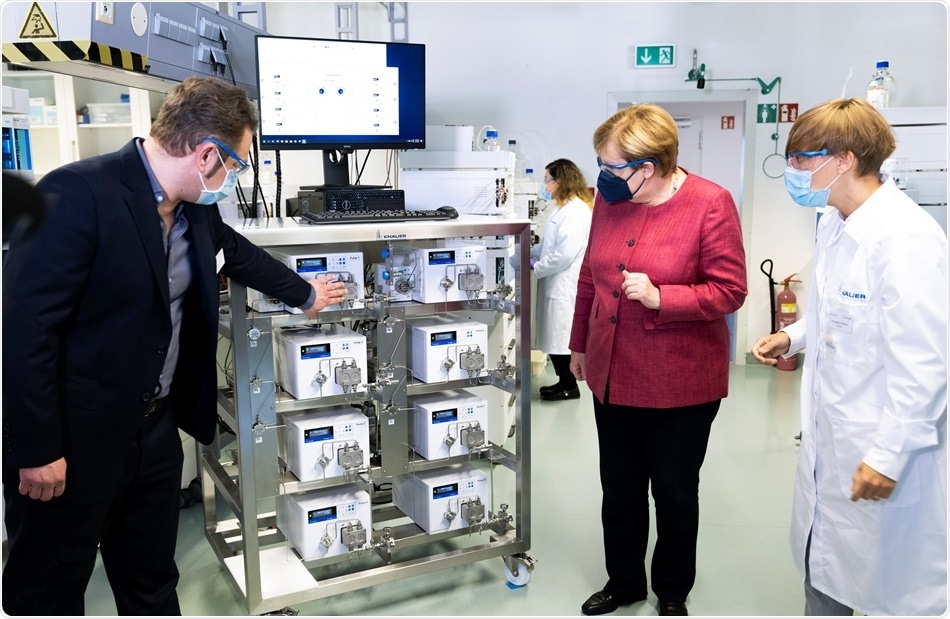German Chancellor Dr. Angela Merkel visited Berlin-based manufacturer of high-tech laboratory instruments KNAUER Wissenschaftliche Geräte GmbH on Friday, Sept. 10, 2021. Managing director and owner of the family business with 160 employees Alexandra Knauer, together with her managing director Carsten Losch, welcomed the Chancellor in the best weather at the company's headquarters in the southwest of the city. The perceptible slight nervousness and excitement in anticipation of the high-ranking visitor quickly gave way as soon as the first words were exchanged with the Chancellor.

Managing Director Carsten Losch (left) and Dr Kate Monks, Head of Applications, Academy & Quality (right) explain an IJM skid for mRNA lipid nanoparticle production to Dr. Angela Merkel. Image Credit: KNAUER Wissenschaftliche Geräte GmbH
Angela Merkel was on site to get an idea of the activities of the medium-sized company. Here, for almost 60 years, equipment has been developed for science and research, "the highest precision technology" as the Chancellor put it.
In particular, Dr. Merkel was interested in the company's systems, that made the encapsulation of the delicate mRNA into vaccinatable lipid nanoparticles against COVID-19 possible in quantities. The delicate mRNA active ingredient is then located inside the lipid nanoparticles (LNP) and can be transported undamaged to the cell to exert its immunizing effect. The upscaling of the production of the lipid nanoparticles was a prerequisite for the provision of the new mRNA vaccines, which were used against COVID-19 for the first time on a large scale worldwide.
In a round of talks, in which company founders Roswitha and Dr.-Ing. Herbert Knauer also took part, Mrs. Merkel and her delegation learned from two KNAUER experts how the development of the so-called "Impingement Jets Mixing Skids" (IJM skids) for lipid nanoparticle production came about. Starting in the summer of 2020, these skids were successfully developed within a few months in close contact with a large pharmaceutical company. This was done in compliance with the strict regulatory requirements of pharmaceutical production. Mass production had thus become possible just in time before regulatory approval of the vaccine.
"Normally, the development and approval of a production facility in the pharmaceutical sector takes years rather than months," said Dr. Matthias Lübbert, who played a leading role in the project. This shows the high level of commitment with which all those involved worked on this project of global significance during the pandemic, he added.
During a tour of the company, the Chancellor visited the device assembly, where all KNAUER precision modules are manufactured that the company combines in its system solutions for the laboratory sector - including the modules for the IJM-Skids.
Another stop on the tour was the company's central laboratory, which is the hub for the company. Here, not only the finished chromatography systems - the company's main area of business - are tested for quality, but also applications for customers developed and the latest prototypes from in-house development are also put through their paces. In both areas, the chancellor spoke with employees and inquired about details of their work.
A second round of talks with the Chancellor, the management and selected employees was devoted to current topics in the world of work, such as gender equality, the training situation and integration.
In her subsequent press statement, the Chancellor referred to KNAUER as "... the jewels of the German Mittelstand, so to speak ...". She appreciated that boss Alexandra Knauer promotes women and brings them equally as men also into leading positions. The training activities and integration activities of the KNAUER company were praised by the Chancellor as well as the noticeable environmental awareness and social responsibility.
Alexandra Knauer thanked Angela Merkel for the visit, which she also understood as an appreciation for the employees who had done something very special in recent months to complete the required production facilities for lipid nanoparticles in time for regulatory approval. She also thanked the chancellor for helping to build trust in the world for products from Germany during her tenure, for the companies and people who work here.
We have met a very personable and professional Chancellor and are very honored by her visit. Before Mrs. Merkel boarded her limousine, she even posed for a group picture with our enthusiastic employees."
Alexandra Knauer, Managing Director
The family-owned company KNAUER Wissenschaftliche Geräte GmbH develops high-tech laboratory instruments for research, routine analysis and production. Liquid chromatography (HPLC) systems are used to analyze liquid samples for constituents and impurities and determine their quantity. The separation of a sample into its components is used in larger chromatography systems, e.g. for the purification of proteins, active ingredients or other valuable substances. For laboratory systems, the company supplies metering pumps, switching valves and detectors for high-pressure applications. Systems for the production of lipid nanoparticles have opened up a new business segment for KNAUER and in 2020 generated a revenue increase of around 30 percent compared to the previous year. Promotion of science and corporate responsibility enjoy a high priority.